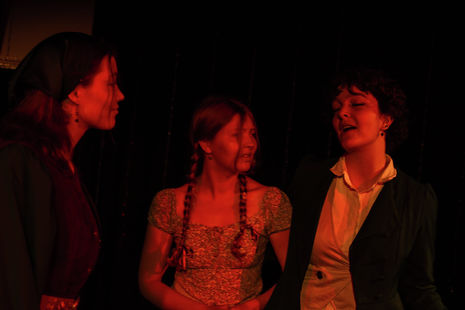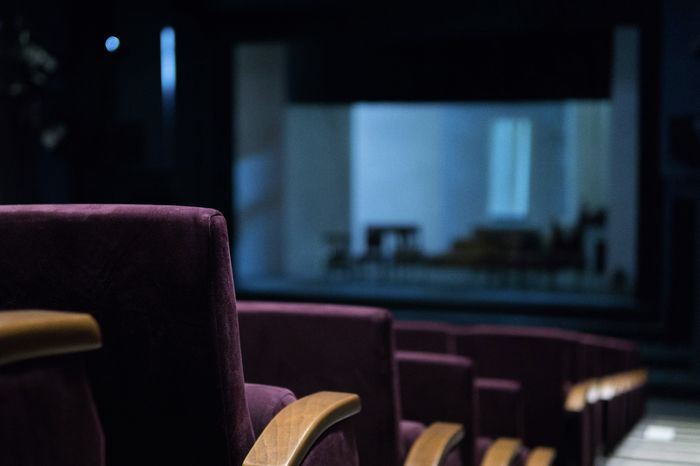What do we do with student-written theatre?
Pol Salvatella Ferrerfàbrega explores how we should be balancing new and established texts – and how to best let student writers thrive

Cinema scripts are hardly ever used in more than one production. Yet curiously a part of theatre lives off restaging the same established texts again and again. The Camdram scene is not an exception: in this Easter Term, only half of the shows are new plays written by students. The rest is, yes, Shakespeare, among others. At first sight this might not seem a bad distribution, as it gives room for emerging playwrights while also allowing directors and actors to face the exciting challenge of a major play or a complex character. But that is not all: in every Easter project (except for one) with an original play, the student playwright is either director or performer at the same time, and few shows staging an established text have appointed someone to adapt it. Surely this situation is not ideal for student writers. But how can it be improved?
“Constantly restaging the same established texts leaves less room for new voices to rise”
Among the roles of Camdram production teams, there occasionally appears the figure of script editor. This, I believe, should be present in more of them – mainly because it helps tailor the texts to contemporary audiences, but also because it is very instructive for a writer to confront themself with the subtle plumbing of an experienced author’s play. Student theatre should shake off the pressure to do successful productions and instead focus on providing an opportunity for people to test their ideas and develop their talents. Hence, more room for adaptations! Don’t be afraid to manipulate those classics, so long as it is done with care and sense. Even if the worst happens, and the result falls apart, all the team may still learn some valuable lessons.
The script editor is then already present in Camdram – but what if a director doesn’t want to change a single word of the original? In this case, writers could fill the role of dramaturg. The tasks of a dramaturg are delving into the author’s biography and style, the context of the play (both historical and fictional) and its intentions, in order to help everyone in the creative team understand the text better. It is a very useful figure for the crew: a person who can comprehend the artistic aims of the project and make suggestions on how best to achieve them, but who at the same time has a fresher look on the production, not being fully immersed in its chaotic process. With both a perspective from within and from the outside, dramaturgs can give useful insights that enrich the final result.
“Don’t be afraid to manipulate those classics, so long as it is done with care and sense”
It is for a similar reason that there should be more student-playwrights who only write. This discussion of opinions, of differing views on the piece, cannot happen when more than one role is taken by the same person. And this discussion, while sometimes frustrating, is almost always fruitful. Certainly, a writer can feel the need to direct or perform a text of their own. The problem arises when they are forced to do so because they could not find anyone else. I can’t affirm this is the case in all projects, but I fear it might be in some of them, as this situation is common even in professional spheres. What could help remedy it? Maybe founding a writers’ society. Maybe just creating a website that stores texts written by students for prospective directors to read them. Or perhaps asking that the ADC Theatre meet a certain termly quota of putting on student-written plays not staged by the playwrights themselves. The solution is not certain. But it seems clear that freeing writers from having to do other roles can benefit the creative process, and with it the show. And I wonder if, seeing their text has chances of being staged by a director, this would not also motivate more students to try their hand at playwriting.
Theatre, of course, learns and evolves from its past. I’m not suggesting here that we should forget it. But if this past is held too sacred, it can become an obstacle: constantly restaging the same established texts leaves less room for new voices to rise. If we agree that the task of student theatre should be to train more than entertain, then it follows that the Camdram community should try to lessen this tendency to look back in search for plays. This could be by staging more texts written by students (not involving the writer in other roles), or by making more adaptations of the classics. Otherwise, offering writers to fill the role of dramaturg can still be a way to give them more opportunities to learn.
 News / Right-wing billionaire Peter Thiel gives ‘antichrist’ lecture in Cambridge6 February 2026
News / Right-wing billionaire Peter Thiel gives ‘antichrist’ lecture in Cambridge6 February 2026 Features / From fresher to finalist: how have you evolved at Cambridge?10 February 2026
Features / From fresher to finalist: how have you evolved at Cambridge?10 February 2026 Film & TV / Remembering Rob Reiner 11 February 2026
Film & TV / Remembering Rob Reiner 11 February 2026 News / Epstein contacted Cambridge academics about research funding6 February 2026
News / Epstein contacted Cambridge academics about research funding6 February 2026 News / Churchill plans for new Archives Centre building10 February 2026
News / Churchill plans for new Archives Centre building10 February 2026










